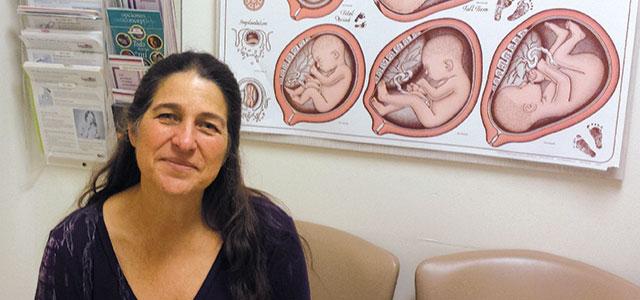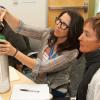
Teaching Clinical Skills and Passion for Caring for the Underserved
“I really like working with people in their most vulnerable and honest state,” says Ann Reppun, an adult and women’s health nurse practitioner with Marin Community Clinics (MCC), a federally qualified health center that provides care to the county’s underserved population. As a clinical instructor with the UC San Francisco School of Nursing, she’s tried to inspire that passion in her students for the past 16 years.
Caring for Patients at Their Most Vulnerable
Nursing was a natural fit for Reppun, who wanted a career in caring that allowed her the freedom to “move around and wear comfortable clothes,” as she puts it. Egged on by her older sister, she enrolled in San Francisco State University’s nursing program. After getting her degree, she worked as an oncology nurse at UC San Diego Medical Center, which she loved because it allowed her to connect with people at some of their most difficult and life-altering moments. “You’re dealing with life and death and pain and suffering, and nurses have a profound influence on a patient’s experience,” she says.
After 15 years in the job, Reppun wanted to expand her knowledge and skills to help people on a longer-term basis. She says, “I was ready for more responsibility, and I wanted to see people over a long period of time, so I went to UCSF and got my MS and became an adult nurse practitioner.”
Providing Care to the Underserved in Marin
Many people think of Marin as an enclave of wealth and privilege nestled between San Francisco and the Wine Country, but Reppun knew there was another face to the county. The area’s high housing costs mean many families are precariously housed, a problem that hits recent immigrants and undocumented workers particularly hard.
Reppun’s facility with Spanish (she’d spent time in South America during college and nursing school) helped her land a job providing primary care at MCC, then located in what she describes as a “beat-up trailer in back of the hospital.” Her primary patient population was, and remains, monolingual Spanish-speaking, and most are either publicly insured through Medi-Cal or Affordable Care Act (ACA)-affiliated health plans or they are uninsured.
She also provided primary care for homeless families through Ritter House (now Ritter Center), a nonprofit organization that provides services for Marin’s homeless and working poor. “I’ve always been attracted to this population, and over the last 16 years that hasn’t changed,” says Reppun.
Much of her work with MCC patients was in women’s health care, which intensified her interest in reproductive rights and increasing access to birth control. She went back to UCSF and became the first adult nurse practitioner to complete its nurse-midwifery and women’s health program, receiving her certification as a women’s health nurse practitioner. “I care for women before they’re pregnant, while they’re pregnant, after they’re pregnant and beyond,” she says. “The only thing I don’t do is catch babies.” (She leaves that to MCC’s 11 certified nurse-midwives, who, she says, deliver 30 percent of Marin County’s babies.)
Passing on a Passion for Caring
In addition to her clinical duties at MCC, Reppun has been an active preceptor for UCSF students since she first started practice. Certified nurse-midwife students, third-year medical students and adult-gerontology and family nurse practitioner students all get the benefit of Reppun’s experience. She benefits from their fresh outlook and thirst for learning. “Even if you love what you do, you want to keep progressing,” she says, and her students challenge her to stay current. “Students at UCSF are the highest caliber, and they’re being trained with cutting-edge information.”
While teaching them the essential clinical skills they’ll need wherever they practice, Reppun also hopes to instill in her students a love for caring for the underserved. “Working [for a federally qualified health center] isn’t where the money is, but it’s where the need is. I want them to see the rewards of it,” she says. She takes two to three students per quarter – a heavy teaching load for a busy practitioner – but she says it ultimately makes her job easier. “In the beginning, it’s time-consuming because there’s a learning curve. But after a couple of weeks, it’s a pleasure to watch them step into their professional roles and become proficient at caring for patients. After that it’s a time savings to me, and there’s an additional intellectual stimulation in working with them that I don’t normally get in my day-to-day work,” she says.
Reppun is obviously doing something right, because last summer she received the School’s Helen Martin Award for Excellence in Clinical Precepting for her work with students. Established in 2013 with funding from the family of Helen Martin, a pediatric nurse practitioner and clinical director at Valencia Health Services who served as volunteer faculty in the School’s Department of Family Health Care Nursing, the award honors clinical faculty for their commitment to clinical instruction, practice-based teaching and leadership in clinical practice. Preceptors are selected based on nominations from students.
It was a nice surprise, says Reppun, to receive recognition for something she loves to do. “I had some of the best teachers ever – like Pilar Bernal de Pheils, JoAnne Saxe, Cynthia Belew. It’s a joy to be able to give back to that education system.”



